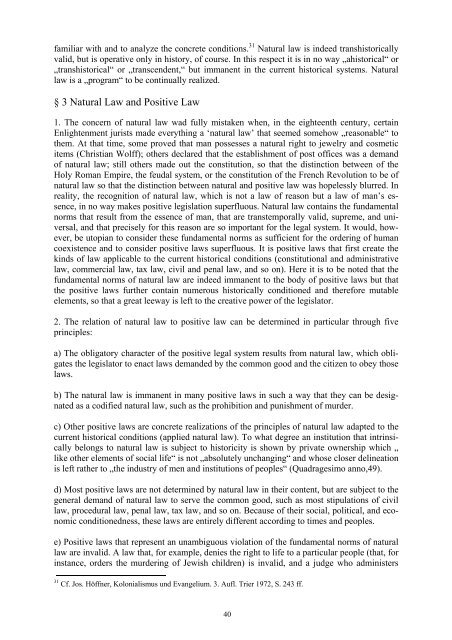Joseph Cardinal Höffner CHRISTIAN SOCIAL ... - Ordo Socialis
Joseph Cardinal Höffner CHRISTIAN SOCIAL ... - Ordo Socialis
Joseph Cardinal Höffner CHRISTIAN SOCIAL ... - Ordo Socialis
You also want an ePaper? Increase the reach of your titles
YUMPU automatically turns print PDFs into web optimized ePapers that Google loves.
familiar with and to analyze the concrete conditions. 31 Natural law is indeed transhistorically<br />
valid, but is operative only in history, of course. In this respect it is in no way „ahistorical“ or<br />
„transhistorical“ or „transcendent,“ but immanent in the current historical systems. Natural<br />
law is a „program“ to be continually realized.<br />
§ 3 Natural Law and Positive Law<br />
1. The concern of natural law wad fully mistaken when, in the eighteenth century, certain<br />
Enlightenment jurists made everything a ‘natural law’ that seemed somehow „reasonable“ to<br />
them. At that time, some proved that man possesses a natural right to jewelry and cosmetic<br />
items (Christian Wolff); others declared that the establishment of post offices was a demand<br />
of natural law; still others made out the constitution, so that the distinction between of the<br />
Holy Roman Empire, the feudal system, or the constitution of the French Revolution to be of<br />
natural law so that the distinction between natural and positive law was hopelessly blurred. In<br />
reality, the recognition of natural law, which is not a law of reason but a law of man’s essence,<br />
in no way makes positive legislation superfluous. Natural law contains the fundamental<br />
norms that result from the essence of man, that are transtemporally valid, supreme, and universal,<br />
and that precisely for this reason are so important for the legal system. It would, however,<br />
be utopian to consider these fundamental norms as sufficient for the ordering of human<br />
coexistence and to consider positive laws superfluous. It is positive laws that first create the<br />
kinds of law applicable to the current historical conditions (constitutional and administrative<br />
law, commercial law, tax law, civil and penal law, and so on). Here it is to be noted that the<br />
fundamental norms of natural law are indeed immanent to the body of positive laws but that<br />
the positive laws further contain numerous historically conditioned and therefore mutable<br />
elements, so that a great leeway is left to the creative power of the legislator.<br />
2. The relation of natural law to positive law can be determined in particular through five<br />
principles:<br />
a) The obligatory character of the positive legal system results from natural law, which obligates<br />
the legislator to enact laws demanded by the common good and the citizen to obey those<br />
laws.<br />
b) The natural law is immanent in many positive laws in such a way that they can be designated<br />
as a codified natural law, such as the prohibition and punishment of murder.<br />
c) Other positive laws are concrete realizations of the principles of natural law adapted to the<br />
current historical conditions (applied natural law). To what degree an institution that intrinsically<br />
belongs to natural law is subject to historicity is shown by private ownership which „<br />
like other elements of social life“ is not „absolutely unchanging“ and whose closer delineation<br />
is left rather to „the industry of men and institutions of peoples“ (Quadragesimo anno,49).<br />
d) Most positive laws are not determined by natural law in their content, but are subject to the<br />
general demand of natural law to serve the common good, such as most stipulations of civil<br />
law, procedural law, penal law, tax law, and so on. Because of their social, political, and economic<br />
conditionedness, these laws are entirely different according to times and peoples.<br />
e) Positive laws that represent an unambiguous violation of the fundamental norms of natural<br />
law are invalid. A law that, for example, denies the right to life to a particular people (that, for<br />
instance, orders the murdering of Jewish children) is invalid, and a judge who administers<br />
31 Cf. Jos. <strong>Höffner</strong>, Kolonialismus und Evangelium. 3. Aufl. Trier 1972, S. 243 ff.<br />
40















